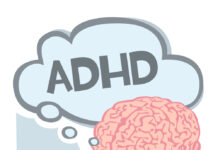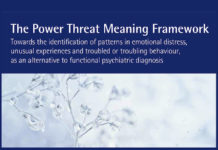New Podcast – is it Really Mental Illness?
From the University of Liverpool News: In a new podcast, Dr. Peter Kinderman, the vice-president of the British Psychological Society, argues that emotional distress is...
Disclosure Does Not Prevent Bias
A study from Lisa Cosgrove at Harvard's Safra Center for Ethics of potential conflicts of interest among DSM-5 committee members, investigators of new DSM-5 diagnoses,...
Rethinking Diagnosis
Imagine that you got upset. Is it very remarkable that I can “diagnose” that you are upset? After all, you are clearly upset. What expert thing did I accomplish by agreeing with you that you were upset? Or imagine that you are angry. Is it very remarkable that I can “diagnose” that you are angry? After all, you are clearly angry. Have I added anything meaningful by saying “I diagnose that you are angry” instead of “You seem angry”? “You look upset” is the simple, truthful thing to say and “I diagnose that you look upset” is a piece of self-serving chicanery.
Illness Inflation: Expanded Medical Definitions Create More Patients
The Milwaukee Journal Sentinel has issued a watchdog report titled “Illness Inflation” that examines how new medical conditions are often the product of industry...
Suckling Pigs, Stray Dogs, and Psychiatric Diagnoses
In "The Order of Things", Michel Foucault, the great French philosopher cites a ‘certain Chinese encyclopedia’ that notes ‘animals are divided into: (a) belonging to the Emperor, (b) embalmed, (c) tame, (d) suckling pigs, (e) sirens, (f) fabulous, (g) stray dogs, (h) included in the present classification, (i) frenzied, (j) innumerable, (k) drawn with a very fine camelhair brush, (l) et cetera, (m) having just broken the water pitcher, (n) that from a long way off look like flies’.
The Myth of Mental Illness Revisited, NIMH Style
When Thomas Szasz’s name comes up in debates over defining mental illness, it is fairly common to hear people say something along the lines of, “Well, he made some good points, but he was just too extreme.” Yet I am struck by how conversations about DSM-5, being released this month, make the crisp arguments Szasz consistently offered for 50 years just as timely as ever. I’d even go so far as to suggest that a large number of counselors, psychologists, social workers, and psychiatrists pretty much agree with the main tenets of Szasz’s argument, despite their ongoing disclaimers.
Duty to Warn – 14 Lies That Our Psychiatry Professors in Medical School Taught...
Revealing the false information provided about psychiatry should cause any thinking person, patient, thought-leader or politician to wonder: “how many otherwise normal or potentially curable people over the last half century of psych drug propaganda have actually been mis-labeled as mentally ill (and then mis-treated) and sent down the convoluted path of therapeutic misadventures – heading toward oblivion?”
Does DSM-5 Matter? Yes; but not for Psychiatrists
What makes the DSM so pernicious is that it is a cultural document whose influence transcends not only psychiatric practice but also the Western civilization from which it originates. Each revision of the DSM rescripts and reimagines how we make sense of our experiences, reinterprets what thoughts, feelings and behaviors are socially sanctioned, and ultimately what it means to be human.
Will Psychiatry’s Harmful Treatment of Our Children Bring About Its Eventual Demise?
The safety of our children is a sacred obligation we strive to preserve. Anything or anyone that harms them becomes the object of our...
How Stigma and Social Factors Drive the Negative Health Outcomes Associated with Autism
A new study explores the interplay between social stress and quality of life for individuals self-identified with high-functioning autism.
Lancet Psychiatry’s Controversial ADHD Study: Errors, Criticism, and Responses
Amid calls for a retraction, Lancet Psychiatry publishes articles criticizing the original finding and a response from the authors.
How About a Diagnostic Alternative for Use in Talk Therapy?
Note: This post originally appeared on August 18, 2014 on dxsummit.org.
On August 5 and 6, 2014, a group of roughly twenty persons met in Washington, DC...
More Thinking about Alternatives to Psychiatric Diagnosis
In my last post, I argued that the single most damaging effect of psychiatric diagnosis is loss of meaning. By ruthlessly divesting experiences of their personal, social and cultural significance, diagnosis turns ‘people with problems’ into ‘patients with illnesses.’ Horrifying stories of trauma, abuse, discrimination and deprivation are sealed off behind a pseudo-medical label as the individual is launched on what is often a lifelong journey of disability, exclusion and despair.
Differing Depression Diagnostic Tools May Influence Research Findings
The type of diagnostic assessment used in research settings, either fully structured or semi-structured interview, may affect which participants in receive a diagnosis of major depression.
Reflections on How We Think About and Respond to Human Suffering, Existential Pain, and...
Any attempt to establish an alternative diagnostic system to the predominantly biologic DSM-5 classifications or to initiate a transformation of the individually oriented mental health treatment systems needs to critically explore how, not only what, we think about health and healing, about mental and emotional suffering, about traumatic experiences and injustices, and the multiple forms of pain that are part of our human existence. The broad critique of the DSM-5 by so many national and international organizations and individual colleagues will in the end not be powerful and far reaching enough without this inquiry into the foundations of our thinking and without reflection about our ways of thinking.
Professionals Push Back on Psychiatric Diagnostic Manual, Propose Alternatives
Criticisms of the DSM-5 spark alternative proposals and calls to reform diagnostic systems in the mental health field.
The Power Threat Meaning Framework One Year On
The team that developed the Power Threat Meaning framework as a diagnostic alternative reflects on the response to the framework after one year.
NIMH Funding Changes Threaten Psychotherapy Research
The National Institute of Mental Health (NIMH) is increasingly shifting its research emphasis toward attempting to uncover biomarkers for “mental diseases,” which may have dramatic consequences for research and training in clinical psychology. In an article to be published in next month’s Professional Psychology: Research and Practice, Marvin Goldfried outlines how the shift in funding priorities for psychological research is tied to the needs of pharmaceutical companies and the biological model in psychiatry.
Top Ten Things You May Not Know About the ICD-10
In this piece for Psychology Today, Dr. Jonathan D. Raskin lists 10 facts about the current version of the International Classification of Diseases, which is...
Does It Matter if We Believe in Mental Illness?
It's clear that different people relate to the idea of "mental illness" and labeling differently. Many people find the experience of being diagnosed with...
The Green Shadow Cabinet and a Mental Health Declaration of Independence
Americans have increasingly lost community and autonomy, and have acquired instead the tyranny of institutionalization: domination by gigantic, impersonal, bureaucratic, standardized entities — visible in large corporations, the workplace, health care, schools, and much of our lives. This institutionalization has made many Americans feel small, isolated, helpless, scared, inattentive, bored, angry, alienated, and depressed.
The Genetics of Schizophrenia: A Left Brain Theory about a Right Brain Deficit in...
In recent months, two teams of researchers in the UK and the US published complementary findings about the epigenetic origins of schizophrenia that have scientific communities who indulge in ‘genetic conspiracy theories’ abuzz. While these results are intriguing, and no doubt involve pathbreaking research methodologies, this line of thought represents a decontextualized understanding both of the symptoms that are typically associated with schizophrenia, and their causes.
Psychiatric Diagnosis Can Lead to Epistemic Injustice, Researchers Claim
A discussion of the role of epistemic injustice in the experiences of patients diagnosed with psychiatric disorders.
Brain Imaging Reveals Psychiatric Disorders are Not Neurological Disorders
Some researchers have been arguing to reclassify all psychiatric disorders as diseases of the brain and nervous system, similar to epilepsy or Parkinson's disease. Neuroimaging research, however, reveals that psychiatric disorders appear to be distinct from neurological disorders, according to a new study published in this month’s issue of the British Journal of Psychiatry.
Mad Flies and Bad Science
Tension mounts across the ideological divide as D-Day (DSM-5 Day) approaches. The APA has powerful allies on its side. President Obama has just launched Decade of the Brain 2 with the announcement two weeks ago that heralds the arrival of BRAIN ( Brain Research through Advances in Innovative Neurotechnologies). If that’s not enough, those who believe that science will ultimately explain madness can always rely on the media to fawn at their feet.

















